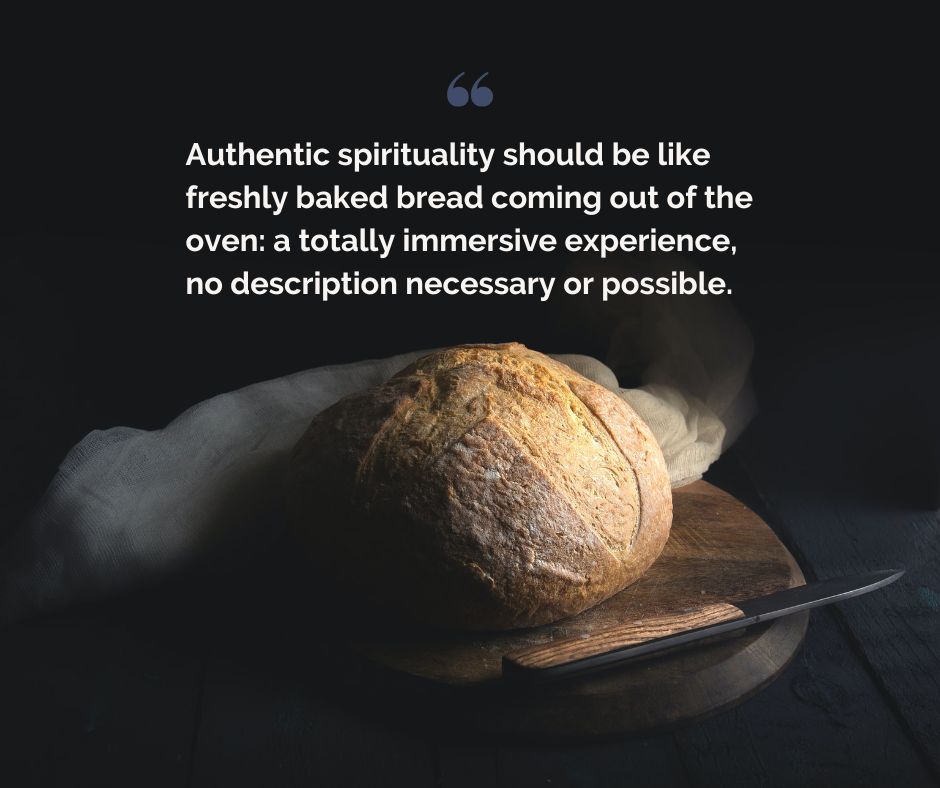The Heaven of Bread

“Can you get that bread out of the oven?” Pam calls to me. “I think it’s done.” I open the oven door and a soft cloud of heat drifts over me. Then the smell wafts out, wave after wave—the yeasty aroma, the malted perfume, the toasted whiff of . . . I don’t know—heaven. Or home. Safety. Love.
As I carry the perfectly browned loaves to a wire rack for cooling, I remember once hearing that authentic spirituality should be like freshly baked bread coming out of the oven: a totally immersive experience, no description necessary or possible. Every powerful encounter with the divine is like that, enveloping us, dissolving our “normal” sense of separateness, revealing—if only for a moment—our oneness with God, with one another and the whole Creation.
Epiphanies like this are direct and self-authenticating. We don’t need a book, a creed, or a set of doctrines to validate what just happened. It isn’t about what we believe or even hope for. It just happens to us, in spite of us, in a cascade of grace. A black sky splashed with a million stars or the touch of a loved one can do it, but so can great suffering, which breaks down that separate self and heaves us, helpless, into the everlasting arms.
When we have an experience like this, we just know it. We don’t need anyone to talk us into it, and no one can talk us out of it. Sadly, most religious or spiritual life is not powerfully immediate, like freshly baked bread emerging from the oven. It’s more akin to the chemical scents pumped into malls to sell cinnamon rolls, a simulacrum many settle for, never discovering the real thing.
If we desire to know God deeply and directly, we must be still, quiet, open. We must learn, every day, to trust what is, right here, right now. Be ready, in other words, to meet God at the oven door.
The “simulacrum of cinnamon scent” reminded me of a passage in Phillip Yancey’s new book “Where the Light Fell.” He’s quotes Augustine reflecting on his pre-conversion years: “I had my back toward the light, and my face toward the things on which the light falls.”
Interesting–at a retreat on Sunday I was teaching from a poem by Joyce Sutphen that is based on Plato’s famous allegory of the Cave, where the person is seated in a cave with a fire behind her and all she can see is the flickering shadows on the wall of the cave in front of her. And because she is chained to her seat she cannot turn and see the fire. So–in Platonic thought–we see only shadows of the real things. But in this poem, the woman frees herself from the chained seat and stumbles out of the cave–and sees the very Fire!
From Out the Cave
by Joyce Sutphen
When you have been
at war with yourself
for so many years that
you have forgotten why,
when you have been driving
for hours and only
gradually begin to realize
that you have lost the way,
when you have cut
hastily into the fabric,
when you have signed
papers in distraction,
when it has been centuries
since you watched the sun set
or the rain fall, and the clouds,
drifting overhead, pass as flat
as anything on a postcard;
when, in the midst of these
everyday nightmares, you
understand that you could
wake up,
you could turn
and go back
to the last thing you
remember doing
with your whole heart:
that passionate kiss,
the brilliant drop of love
rolling along the tongue of a green leaf,
then you wake,
you stumble from your cave,
blinking in the sun,
naming every shadow
as it slips.
yes, Augustine had what David was describing, a spirituality once removed.
The comments are already a bonus! As one who has recently, sadly, begun a gluten free experiment – there is *nothing* like fresh bread. There are no substitutes with God either (although we try). Thankfully, that aroma can still affect me deeply.
Yes, I feel a bit sorry for the GF community. But, as you say, the aroma can still be completely savored.
oh, now there is a metaphor—let’s avoid a gluten-free relationship to God.
I’m waiting for a GF reader to exclaim, Gluten-free bread is still bread, still great!
No words can express it – so true. Pablo Neruda’s “Odes to Common Things” is the closest I’ve found so far. Thanks, David!
Just read “Ode to Common Things”–wow, what a gift. Thank you, Johnna.